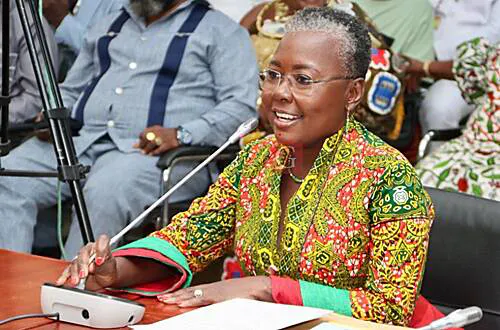Ghana has taken a significant step to reform its fisheries sector and avert looming trade sanctions from the European Union (EU) with the passage of the Fisheries and Aquaculture Bill, 2025.
The new law, approved by Parliament under a certificate of urgency from the Presidency, is expected to reset the country’s fisheries governance and address long-standing compliance issues that have attracted international scrutiny.
Speaking at the Government Accountability Series, Minister for Fisheries and Aquaculture, Hon. Emelia Arthur, announced the passage of the bill and described it as a transformative legal milestone.
According to her, the ministry had worked tirelessly in recent months to finalize the bill and push it through Parliament in time to respond to urgent concerns, particularly the EU’s yellow card warning issued to Ghana in 2021.
“Some of the things we have done in the past six months include one, passage of the Fisheries and Aquaculture Bill 2025, to achieve a meaningful reset of the fishery sector in our national interest, and also to address issues of the infamous EU yellow card on Ghana’s fisheries.”
Hon. Emelia Arthur, Ghana’s Minister for Fisheries and Aquaculture
The bill introduces a comprehensive legal and institutional framework aligned with international best practices. It establishes an independent Fisheries Commission tasked with overseeing the management, development, conservation, and sustainable use of Ghana’s marine and aquaculture resources.
According to Minister Arthur, this is a crucial move to ensure long-term economic viability, equity, and environmental sustainability in the sector.
“This landmark legislation represents a transformative step toward a sustainable, equitable, and economically viable fisheries sector. By strengthening the legal and regulatory framework, the bill enhances Ghana’s global credibility, especially with key export partners such as the European Union.”
Hon. Emelia Arthur, Ghana’s Minister for Fisheries and Aquaculture
The yellow card warning issued by the EU in June 2021 under Article 32 of Council Regulation (EC) No. 1005/2008 identified Ghana as a non-cooperating third-party country in the fight against illegal, unreported, and unregulated (IUU) fishing.
According to the Minister, the warning was triggered by multiple governance lapses, including an expired marine fisheries management plan, weak monitoring and control of fishing fleets, legal inconsistencies, and concerns over transshipment practices at sea.
“The issues raised by the European Commission included the expired marine fisheries management plan, transshipment at sea, inconsistencies in the existing fisheries legal framework, and deficiencies in the monitoring, control, and surveillance of fleet”.
Hon. Emelia Arthur, Ghana’s Minister for Fisheries and Aquaculture
She warned that Ghana has a limited window to lift the yellow card, adding that failure to act decisively could result in a red card, which would lead to severe trade restrictions. “It’s been five years now, and we have such a small window to work to lift it. Otherwise, we get into a red card status and that works negatively in the interest of Ghana fisheries,” she cautioned.
Ghana’s seafood exports generate over $425 million annually. The red card would mean a loss of access to the EU market—one of Ghana’s biggest export destinations—and the potential collapse of thousands of livelihoods across the country’s coastal regions.
To prevent this, the new law tightens the regulatory regime across multiple fronts. It imposes stricter penalties for illegal fishing and introduces advanced enforcement tools to monitor activities within Ghana’s territorial waters.
The legislation also prioritizes the safety, security, and welfare of crew members and personnel working aboard fishing vessels.
“Importantly, the legislation introduces stricter penalties and enforcement tools to curb illegal fishing, protect marine biodiversity, and rebuild overexploited fish stocks. It also places emphasis on ensuring the safety, security, and welfare of all personnel working aboard fishing vessels.”
Hon. Emelia Arthur, Ghana’s Minister for Fisheries and Aquaculture
In a significant policy shift to support small-scale fishers and coastal communities, the law expands Ghana’s inshore exclusive zone to 12 nautical miles or a 50-meter depth.
This adjustment is designed to protect critical breeding grounds and enhance the productivity of artisanal fishers who depend heavily on inshore resources for their livelihoods.
“In a major gain for coastal communities and Ghana’s fisheries resources, the bill expands the inshore exclusive zone to 12 nautical miles or a 50-meter depth. This will protect critical breeding grounds and enhance the productivity and livelihoods of over the 2.7 million Ghanaians who depend on small-scale fishing.”
Hon. Emelia Arthur, Ghana’s Minister for Fisheries and Aquaculture
Hon. Emelia Arthur commended Parliament for its bipartisan support in passing the bill and assured the public of the ministry’s commitment to implementing its provisions.
She underscored that the legislation was introduced under a certificate of urgency from President John Dramani Mahama as part of his broader reset agenda for the country.
With the Fisheries and Aquaculture Act now in place, Ghana’s focus turns to its implementation and enforcement as the country races against time to lift the EU yellow card, preserve its international trade relations, and restore the sustainability of its marine resources.
READ ALSO: GRA Questions Legitimacy of Debt Behind NIA Disconnection



















